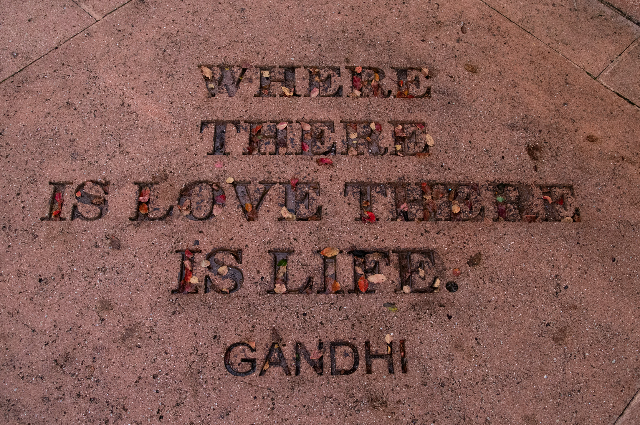
"Peace is its own reward." — Mahatma Gandhi
India, a land of ancient wisdom and cultural diversity, has long been a beacon of peace and non-violence. From the teachings of Mahatma Gandhi to its role in global diplomacy, India has consistently advocated for harmony and coexistence, serving as an inspiring example to the world. Despite its history of invasions and struggles, India has always chosen the path of dialogue and unity, influencing countless global movements and becoming a steadfast promoter of peace on the international stage.
Historical Roots of Peace and Non-violence
India's commitment to peace is deeply rooted in its history and spiritual traditions. Ancient Indian philosophies like Ahimsa (non-violence) and Vasudhaiva Kutumbakam (the world is one family) promote universal brotherhood. These concepts were not just philosophical ideals but guiding principles that shaped India's interactions with the world.
One of the most powerful historical examples is Emperor Ashoka the Great. After witnessing the devastating loss of life in the Kalinga War, Ashoka experienced a profound transformation. He renounced violence and adopted Buddhism, dedicating his reign to spreading the teachings of compassion and tolerance across Asia through edicts carved on stone pillars. His messages encouraged kindness, respect for all living beings, and peaceful coexistence, centuries before the modern concept of human rights emerged.
Buddha’s Teachings and Global Influence
India is also the birthplace of Gautama Buddha, whose teachings of peace, compassion, and detachment spread across the world, laying the foundation for one of the most peaceful religions — Buddhism. The Buddha’s message of ending suffering through self-awareness and kindness continues to guide millions worldwide.
A poignant story from Buddha’s life illustrates his commitment to peace. When a warrior named Angulimala, known for his violent ways, tried to attack Buddha, the sage remained calm and refused to retaliate. His sheer presence and words transformed Angulimala, turning him into a monk who spent the rest of his life helping others. This story exemplifies India’s enduring belief in the transformative power of peace and forgiveness.
Gandhi’s Legacy: The Power of Non-violent Resistance
"You may never know what results come of your actions. But if you do nothing, there will be no result." — Mahatma Gandhi
Mahatma Gandhi, the father of the Indian nation, became a global icon of peace through his philosophy of Satyagraha (truth-force). His non-violent struggle against British colonial rule not only won India its independence but also inspired global civil rights movements, from Martin Luther King Jr. in the U.S. to Nelson Mandela in South Africa.
One of the most remarkable moments in Gandhi’s life was the Salt March of 1930. Instead of retaliating against oppressive British policies with violence, Gandhi led a 240-mile march to the Arabian Sea to make salt, defying unjust laws peacefully. His quiet determination and moral strength shook the British Empire and proved that peaceful resistance could be more powerful than violence.
Gandhi’s influence extended far beyond India. His philosophy inspired movements against apartheid, colonialism, and injustice worldwide, solidifying India’s reputation as a preacher of global peace.
India’s Role in Global Diplomacy and Peacekeeping
Since gaining independence, India has actively participated in peacekeeping missions under the United Nations, contributing troops to conflict zones worldwide to restore order and protect civilians. As one of the largest troop contributors to UN missions, India has played a critical role in stabilizing war-torn regions, from Africa to the Middle East.
India’s diplomatic approach is centered on promoting dialogue and de-escalation. For instance, during the Korean War, India acted as a mediator, helping negotiate the ceasefire that prevented further bloodshed. Similarly, India consistently advocates for nuclear disarmament, championing the idea that true power lies in peace, not destruction.
Spiritual and Cultural Influence: Spreading Peace Across Borders
India’s rich cultural heritage has also been a medium of peace. The practice of Yoga, an ancient Indian discipline, is now embraced globally as a tool for physical, mental, and spiritual well-being. The International Day of Yoga, celebrated annually on June 21, reflects India's gift to the world — a path to inner peace that transcends borders.
The teachings of Indian saints and philosophers continue to inspire unity. Swami Vivekananda, addressing the Parliament of the World’s Religions in 1893, famously declared:
"I am proud to belong to a religion which has taught the world both tolerance and universal acceptance."
His speech, emphasizing acceptance and mutual respect, was met with thunderous applause and remains a powerful reminder of India’s message of harmony.
Modern India: Balancing Power with Peace
Despite being a rising global power, India continues to champion peace. Even in the face of conflicts, India advocates for peaceful resolutions through dialogue. The country’s foreign policy emphasizes non-alignment and mutual respect, reinforcing its commitment to global stability.
India’s handling of conflicts, whether through bilateral talks or international mediation, reflects its belief that war is the last resort. Even with neighbouring tensions, India has repeatedly chosen diplomacy over aggression, earning respect as a nation that values humanity above hostility.
India’s Message for the Future
India’s journey as a preacher of global peace teaches us that peace is not merely the absence of war but the presence of justice, empathy, and understanding. It shows the world that true strength lies not in domination but in compassion, and that change can be achieved not through violence, but through perseverance and moral courage.
As Rabindranath Tagore wrote:
"Where the mind is without fear and the head is held high... Into that heaven of freedom, my Father, let my country awake."
India continues to awaken the world, guiding it toward a future where peace and humanity prevail. By embracing its ancient wisdom and leading by example, India remains a powerful preacher of peace — a nation that teaches the world that even in the darkest times, the light of non-violence can guide us home.
